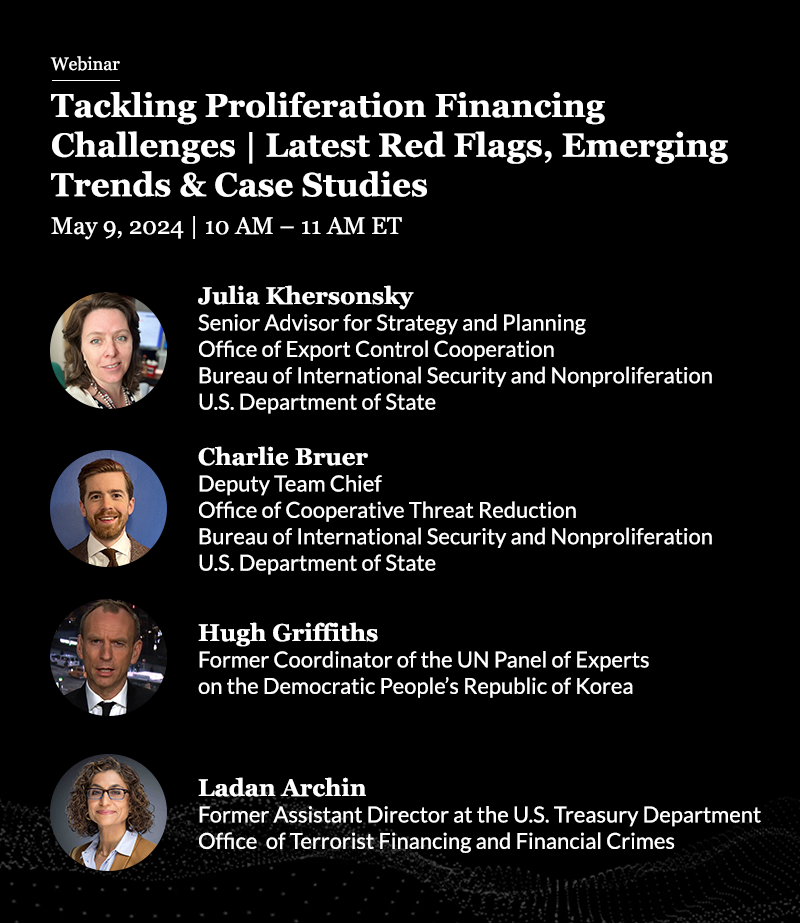Digital Assets in the Crosshairs
Navigating the New Frontier of Proliferation Financing
📅 May 1, 2024
📅 May 1, 2024
In an era where the digital economy is not just expanding but exploding, digital assets such as cryptocurrencies, tokens, and NFTs have transitioned from being niche investments to key elements in global financial transactions. Their unique characteristics—decentralization, speed of transfer, and borderless transactions—offer unprecedented opportunities for growth, innovation, and financial inclusion. However, alongside these opportunities, digital assets also present new challenges and vulnerabilities, particularly in the realm of financial security and compliance. One of the most pressing and complex challenges is the role these assets can play in proliferation financing.
Historically, proliferation financing has relied heavily on the conventional financial system and cross-border trade mechanisms. In recent years, the advent of digital assets has marked a significant shift in how proliferation financing can be conducted. The digitalization of assets offers several advantages that can be exploited for illicit purposes: enhanced anonymity, the ability to quickly move large sums across borders without detection, and reduced reliance on traditional financial institutions that are subject to international scrutiny and compliance standards.
The adoption of digital assets in proliferation financing represents a natural evolution in the age of digital finance. It reflects a broader trend of leveraging technological advancements to circumvent controls and exploit vulnerabilities in the global financial system.
The integration of digital assets into the financial landscape has heralded a new era of efficiency and innovation. However, the very attributes that make digital assets appealing for legitimate use also make them potent tools for illicit financial transactions.
Anonymity and Privacy Features of Digital Currencies: Blessing and Curse
Digital assets, particularly cryptocurrencies, offer levels of anonymity and privacy that are not typically available with traditional financial transactions. Although these features are celebrated for protecting user privacy and resisting censorship, they also create opportunities for malicious actors to obscure their identities and financial activities. Anonymity-enhancing technologies such as mixing services and privacy coins complicate the task of tracking the flow of funds, making identifying and stopping illicit financial activities difficult for authorities. In response to the Hamas attack on Israel in October 2023, some blockchain analytics firms began to proactively investigate addresses tied to the terrorist group. FinCEN in October also proposed a new regulation to enhance transparency in in virtual currency mixing and to combat terrorist financing.
Beyond Borders: The Challenge of Regulating Global Crypto Transactions
The global and decentralized nature of digital assets allows for rapid cross-border transactions, often without the need for traditional financial intermediaries. This capability enables funds to move across jurisdictions with ease, outpacing the reach of any single regulatory body. The absence of a centralized oversight mechanism presents a significant challenge to monitoring and controlling the flow of funds related to proliferation financing. Regulatory discrepancies between countries further exacerbate this issue, creating gaps that can be exploited for illicit transfers.
Binance was investigated and ultimately settled with regulators last year for facilitating money laundering, sanctions violations, and allowing transactions involving illegal proceeds to pass through its platform unchecked. The crypto exchange’s global presence and the ease with which users could conduct transactions across borders without significant oversight highlighted the regulatory difficulties in tracking the movement of potentially illicit funds through cryptocurrency networks. This case not only underscores the complexities of enforcing AML regulations in the decentralized and borderless realm of digital assets but also the urgency for international regulatory cooperation and the development of standardized AML protocols for cryptocurrency exchanges worldwide.
North Korea’s Use of Cryptocurrencies
North Korea has been reported to use cryptocurrencies extensively to bypass international sanctions and fund its weapons programs. The Lazarus Group, a cybercrime group with ties to the DPRK regime, has been involved in several high-profile cyber-attacks aimed at stealing cryptocurrencies. One notable instance is the group’s involvement in the WannaCry ransomware attacks, which demanded ransom payments in Bitcoin. Additionally, North Korean hackers have been implicated in attacks on cryptocurrency exchanges, stealing hundreds of millions of dollars’ worth of digital assets.
The international community—including the United Nations, international governments, and various cybersecurity firms—has been monitoring and reporting on the Lazarus Group’s activities. Efforts to trace and recover stolen funds have led to increased cooperation between government agencies and the private sector, emphasizing the need for enhanced cybersecurity measures and robust AML/KYC protocols by cryptocurrency exchanges and wallets, as well as the importance of international collaboration in tracking and mitigating the use of digital assets for illicit purposes. Cybersecurity also plays a critical role in protecting against state-sponsored cybercrime and the necessity for exchanges to implement stringent security and compliance measures.
The ISIS Crypto Conundrum: Between Reality and Rhetoric
Although ISIS has reportedly been exploring the use of cryptocurrencies to fund operations, the widespread adoption of virtual assets for terrorist financing has not been extensively documented. However, there is evidence to suggest that pro-ISIS networks have utilized cryptocurrencies to facilitate their activities as documented by the US Treasury Department. Blockchain analytic firm TRM Labs’ investigations in 2023 revealed the use cryptocurrency by pro-ISIS networks in Tajikistan, Indonesia, Pakistan, and Afghanistan, highlighting a worrying use of digital finance in terrorism.
Hamas’s High-Tech Hustle: Crypto for Campaigns
Hamas, designated as a terrorist organization in several countries, including the United States and the European Union, has used cryptocurrencies to bypass international sanctions and secure funding. In particular, the group’s military wing, the Izz ad-Din al-Qassam Brigades, publicly solicited Bitcoin donations via social media and dedicated websites. In response to Hamas’s efforts to use cryptocurrencies to raise funds, OFAC has sanctioned the organization’s financial facilitators, issued an alert, noting the variety of ways in which Hamas raises money, including the use of virtual currencies, and settled with the world’s largest cryptocurrency exchange, Binance, for violations that included failure to report transactions associated with the Qassam Brigades, Palestinian Islamic Jihad, and other terrorist groups.
In the face of challenges posed by digital assets in proliferation financing, a multifaceted approach combining technology, international cooperation, and adherence to best practices is essential for mitigating risks. Stakeholders across the financial ecosystem can enhance their ability to detect, prevent, and respond to the misuse of digital assets for proliferation financing by implementing strategies to investigate, track, and conduct enhanced due diligence on risky clients and transactions:
Advanced Monitoring and Analytics: Tools and Technologies for Tracking Digital Asset Transactions
Technological advancements have given rise to sophisticated tools and analytics platforms capable of monitoring digital asset transactions with a high degree of precision. Blockchain analytics software, for instance, can trace the flow of digital currencies across different wallets and exchanges, helping to uncover patterns indicative of illicit activity. These tools leverage the inherent transparency of public blockchains to identify suspicious transactions, even in the absence of traditional identifiers. In addition, AI and machine learning algorithms can analyze vast datasets to detect anomalies or trends that human analysts might overlook, providing early warnings of potential misuse.
International Cooperation Among Regulators, Law Enforcement, and Financial Institutions
The global nature of digital assets necessitates international cooperation to effectively combat their misuse in proliferation financing and other financial crimes. This cooperation can take various forms, including information-sharing agreements, joint investigations, and harmonized regulatory standards. By working together, countries can close the gaps in the global regulatory framework that malicious actors might exploit. Furthermore, international forums and task forces dedicated to digital asset regulation and financial crime prevention can facilitate the exchange of best practices and insights, enhancing the collective ability to address these challenges. The Financial Action Task Force, for example, during its plenary in 2021 finalized and adopted guidance on how to implement the October 2020 revision to its standards, requiring the assessment and mitigation of proliferation financing risks. The guidance highlighted virtual assets and virtual asset service providers (VASPs) as being vulnerable to individuals, entities, and counterparties that engage in proliferation financing.
Best Practices for Financial Institutions to Identify and Report Suspicious Activities
Financial institutions are at the forefront of identifying and reporting suspicious activities concerning digital assets. To effectively fulfill their crucial obligations, adopting best practices in compliance and due diligence is essential. These practices include:
By implementing these best practices, financial institutions can significantly mitigate the risk of illicit finance, playing a pivotal role in global counterproliferation efforts and contributing to a more secure financial system.
Over the past six months, the Russian Federation has vetoed a renewal of UN sanctions against Iran’s ballistic missile and UAV program, as well as a resolution extending the mandate of the UN Panel of Experts monitoring the sanctions on North Korea, while at the same time importing Iranian and North Korean UAVs and ballistic missiles for use in its war against Ukraine.
Russia’s vetoes have effectively dismantled the multilateral sanctions framework on Iran and abolished multilateral sanctions monitoring capabilities for North Korea. Russia’s procurement of North Korean ballistic missiles and Iranian UAVs in Ukraine further heighten proliferation finance and sanctions risk for the private sector.











 Fake News vs. Real News – The Importance of Media in Due Diligence
Fake News vs. Real News – The Importance of Media in Due DiligenceThis site uses cookies. By continuing to browse the site, you are agreeing to our use of cookies.
Accept settingsHide notification onlySettingsWe may request cookies to be set on your device. We use cookies to let us know when you visit our websites, how you interact with us, to enrich your user experience, and to customize your relationship with our website.
Click on the different category headings to find out more. You can also change some of your preferences. Note that blocking some types of cookies may impact your experience on our websites and the services we are able to offer.
These cookies are strictly necessary to provide you with services available through our website and to use some of its features.
Because these cookies are strictly necessary to deliver the website, refusing them will have impact how our site functions. You always can block or delete cookies by changing your browser settings and force blocking all cookies on this website. But this will always prompt you to accept/refuse cookies when revisiting our site.
We fully respect if you want to refuse cookies but to avoid asking you again and again kindly allow us to store a cookie for that. You are free to opt out any time or opt in for other cookies to get a better experience. If you refuse cookies we will remove all set cookies in our domain.
We provide you with a list of stored cookies on your computer in our domain so you can check what we stored. Due to security reasons we are not able to show or modify cookies from other domains. You can check these in your browser security settings.
These cookies collect information that is used either in aggregate form to help us understand how our website is being used or how effective our marketing campaigns are, or to help us customize our website and application for you in order to enhance your experience.
If you do not want that we track your visit to our site you can disable tracking in your browser here:
We also use different external services like Google Webfonts, Google Maps, and external Video providers. Since these providers may collect personal data like your IP address we allow you to block them here. Please be aware that this might heavily reduce the functionality and appearance of our site. Changes will take effect once you reload the page.
Google Webfont Settings:
Google Map Settings:
Google reCaptcha Settings:
Vimeo and Youtube video embeds:
You can read about our cookies and privacy settings in detail on our Privacy Policy Page.
Privacy Policy